MOVIE REVIEW – As divisive as his films are, many agree that Zack Snyder’s career has always been a trendsetter. When the filmmaker’s strong grasp of visual style and flair (developed during his early work in the music video scene) got Hollywood to come knocking, Snyder spent the next few years bringing to life a variety of concepts that most considered “unfilmable”.
The ground-breaking adaptation of the comic book “300”, which arguably redefined blockbuster action in pop culture throughout the early part of the century, led directly to Snyder getting his hands on the holy grail of “Watchmen” in 2009. Although superhero movies in general went on to take on the lighthearted tone of Marvel’s “Iron Man” rather than Snyder’s grand and epic style, the seeds of DC’s superhero world had already been planted, which consumed him for much of the next decade – and eventually led to darker, more cynical and self-reflexively critical comic book adaptations like “The Boys”, and many more films in later years.
Zack Snyder, the gamer
And that brings us to Rebel Moon Part One: Child of Fire, a film that best encapsulates the ambitions – and flaws – at the heart of the new fantasy/sci-fi film. The script, written by Snyder, Shay Hatten and Kurt Johnstad, which is clearly intended to launch an entire franchise, contains as much world-building, sprawling subplots and as much story as it can possibly contain. And in 2 hours and 14 minutes, the director packs in everything from the adventurous spirit of Star Wars to the stunning visuals and creature design of James Cameron’s Avatar to the complex and serious mythology of Dune. But as the slow and plodding first act gives way to a tepid – reminiscent of the classic war film The Dirty Dozen – ‘let’s get the gang together’ middle section and an explosive but perfunctory climax, the main source of inspiration for the space opera becomes abundantly clear.
Rising Moon draws more than parallels with The Seven Samurai and The Seven Great Men (or, for some ages, The Life of a Bug) from a more surprising touchstone: video games.
As much as this may seem in keeping with the director’s sensibility and pioneering spirit, especially as the growing wave of video game adaptations is the industry’s next big thing, Rebel Moon and its reels of epic imagery almost collapse under the weight of such a non-filmic narrative approach. Between that and 2021’s The Army of the Dead, it’s undeniable that Snyder has emerged from his troubled DC experience with a healthier perspective on the current studio system, a refreshing turn towards making original films, and (dare I say it) an infinitely better fit between filmmaker and material. That said, it is a regrettable fact that his storytelling skills leave much to be desired.
Slow start and winding middle section
For all its blockbuster swagger, Rebel Moon is still surprisingly understated at the start. The film opens with a ponderous expository dump narrated by Anthony Hopkins, who voices an ancient robot named Jimmy (played on set by Dustin Ceithamer), but settles into a nice rhythm as we meet our protagonist, “reluctant” in Final Fantasy fashion. The outsider Kora (played by the steely and convincing Sofia Boutella), who settled on the barren Veldt moon two years before the events of the film, is content to live anonymously in a village of hedonistic, Viking-like settlers. All the typical “hero’s journey” clichés are ticked off here, from the man who innocently falls for her (Michiel Huisman’s Gunnar, who conveys his clumsily trying attraction mostly convincingly), through her enigmatic backstory, which we soon learn through voluminous flashbacks, to the imminent threat of the Empire (colloquially known as the authoritarian “Mother World”) arriving on her doorstep.
As action-oriented as he is, Snyder takes his time and lets these early moments breathe. Perhaps a little too much, as it turns out.
The real problem is that both in the early, dull and clichéd exposition and in the later, more enjoyable plot, the characters’ mouths are not shut, and dialogue has never been a strong point of most of Snyder’s films. Although this society’s emphasis on simple living and worldly pleasures helps ground this space opera in something tangible, no character manages to put sentences into the mouths of real people in the way real people talk. By the time Kora begins to recite his motivations and backstory out loud, dozens of times (“I’m only telling you this so you know who I am,” Kora literally says to Gunnar at one point, after a lengthy flashback recounting his origins), it’s easy to imagine that the dialogue that pops up on screen, reminiscent of a weak video game, is being used to provide us, the playful viewers, with the bare minimum of information.
Controllable characters and NPCs
The problem only gets worse when the plot kicks off in earnest, triggered by the evil Admiral Ed Skrein Noble and his Imperium warship, who, along with a small army of invaders, appear over Veldt and claim a share of the inhabitants’ precious grain stores. Kora’s high-speed battle with some unruly soldiers (disappointingly, Snyder here resorts to threats of sexual violence as a motivator) dashes any hopes of a peaceful solution, and leads him on an interplanetary mission to assemble a team of criminals, rebels and revolutionaries to help his small town beat back their oppressors. The problem is, few of these oddballs get a good reason to join up in the first place. Several times Kora and Gunnar arrive at some gloriously imagined new location (including a blatantly stolen “cantina” imitation from the first Star Wars), meet a new character just in time to take on a random side mission to prove their worth, and simply move on to the next newcomer. This bizarrely episodic structure could be lifted straight out of countless video games, where NPCs mill around without actual guts … right up until the moment the protagonist interacts with them and starts the next level.
It’s a shame, too, because it’s a combination of Kai, played by Charlie Hunnam, played by Charlie Hunnam, played by Bae Doona, played by Nemesis, played by Staz Nair, played by the perpetually shirtless former slave Tarak (who is like a Conan the Barbarian afterthought), Djimon Hounsou’s Titus, the disgraced military general, and Ray Fisher as Bloodaxe, the rebel leader, none of whom develop or bond in any meaningful way, deserved much better.
The trade-offs of streaming
And then there’s Netflix for everything. As much as streaming nowadays allows films of this scale and risk to exist at all, it really does a disservice that most viewers will never have the opportunity to experience a story of such overwhelming scale and unbridled creativity – for all his narrative blind spots, Zack Snyder still has a masterful eye for composing and framing epic shots – on the big screen. The full impact of the thundering sound design, Snyder’s own cinematography and Tom Holkenborg’s (known as Junkie XL) dynamic, atmospheric and stirring score is impossible to replicate from a laptop or daytime TV. Of course, one might then legitimately question whether the video-game nature of the story was partly done to satisfy the ‘wits’ of the streaming service’s omnipotent algorithm; much like Snyder’s outright admission that he was told that movies longer than two hours don’t perform well, perhaps there’s something about a series of fetch quests reminiscent of video-game cutscenes that has proven to keep the average Netflix subscriber occupied while playing on their phone.
Cynical wording? Probably, but it seems there is little else to explain the gap between the film’s star power and the brutally self-indulgent treatment of most of the characters. True, we know that an extended director’s cut is in the works (which would address both the lack of character development and the disturbingly bloodless violence of the first version)… but – speaking of gaming – dear Mr Snyder, when was the last time you heard of gamers celebrating the release of patches and DLCs needed to fix the fundamental problems of a new release?
Everything put together
Ultimately, Rebel Moon is little more than a jumbled collection of world-building, mythology and epic storytelling that we’ve seen done better many times before – even in better video games. It’s quite certain that die-hard Snyder fans will find much to rave about, even Snyder’s usual penchant for bold storytelling choices or idiosyncratic themes will fail to excite casual viewers or those who don’t particularly fancy the director anyway.
Sometimes it can be tricky when genre filmmakers finally get the chance to make their long-delayed passion project, which ranges from James Cameron’s Avatar to Brad Bird’s notoriously misguided Tomorrowland. Rebel Moon sits somewhere in the middle – not disastrous enough to be a horror akin to Jupiter Ascending or Valerian, but not memorable or emotionally effective enough to merit the already heralded must-see sequel.
In light of this, at the end of Rebel Moon‘s credits, “The end of the first part seems more of a threat” than a promise.
-Gergely Herpai (BadSector)-
Rebel Moon
Direction - 3.2
Actors - 3.7
Story - 2.6
Visuals/Music/Sounds - 8.2
Ambience - 2.8
4.1
AVERAGE
Rebel Moon", Zack Snyder's new film, is a visually stunning but story-poor and clichéd sci-fi, reminiscent of video game tie-ins. Despite the overly richly developed world and spectacular scenes, the film suffers from sloppy character development and lack of coherent storytelling. While technical elements such as music and visuals stand out, the film overall is aimed more at Snyder fans than the average viewer.

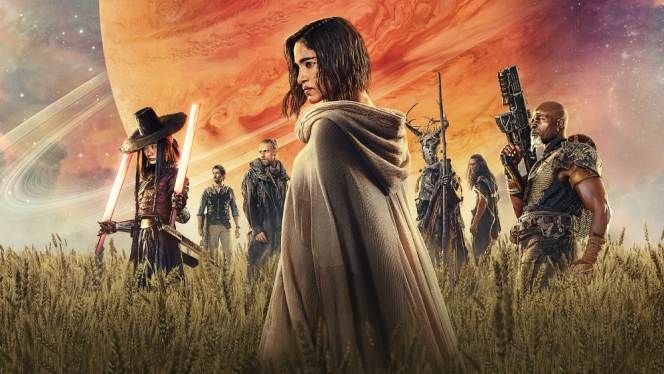
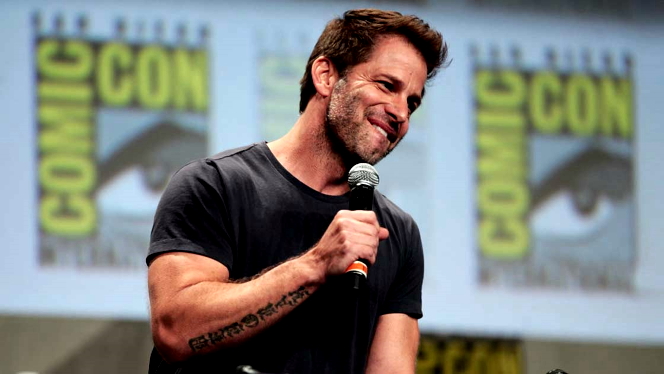
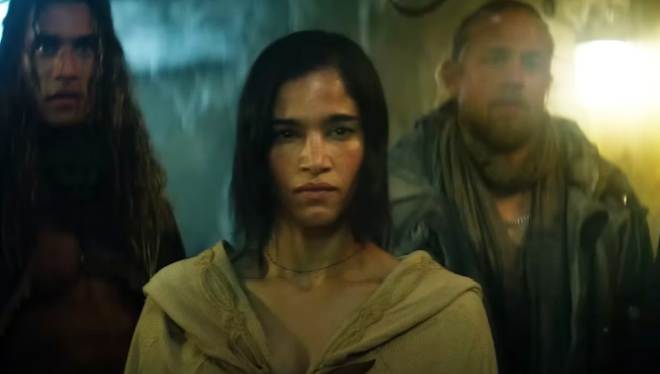
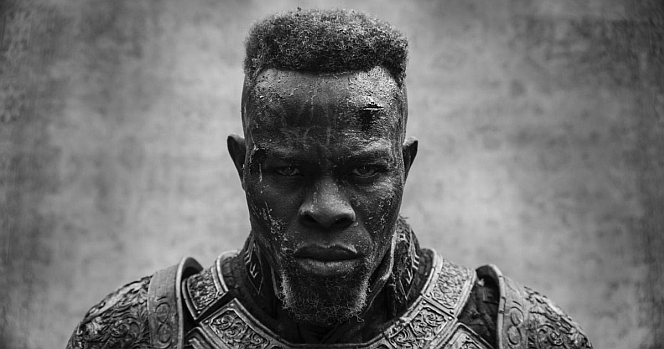
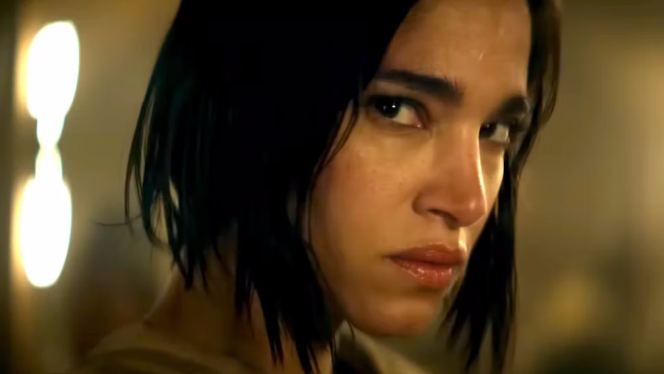








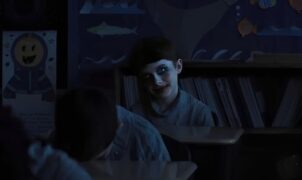

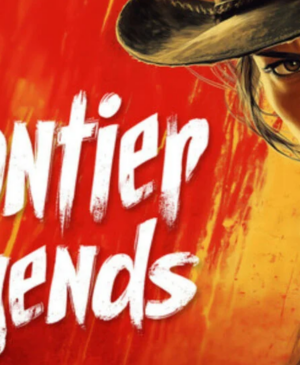
![[TGA 2025] Star Wars: Galactic Racer Focuses on High-Stakes Podrace Runs [VIDEO]](https://thegeek.games/wp-content/uploads/2025/12/theGeek-Star-Wars-Galactic-Racer-300x365.jpg)


Leave a Reply